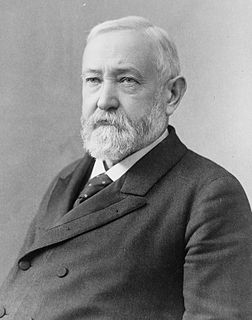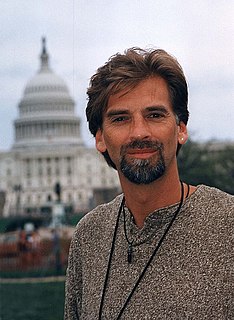A Quote by Jeremy Rifkin
Humanity cannot afford to acknowledge all of the blood that it spills and the destruction it inflicts on the world in its effort to perpetuate itself. Desacralization is a process that allows us to sever any relationship we might feel to other living things. By draining the aliveness out of things, we can pretend that our control and manipulation are of little consequence. Man the trapper becomes man the taxidermist, disemboweling nature of its spontaneity and movement, and stuffing it with a leaden inanimateness.
Quote Topics
Related Quotes
Devotion {to the spiritual master} becomes the purest, quickest, and simplest way to realize the nature of our mind and all things. As we progress in it, the process reveals itself as wonderfully interdependent: We, from our side, try continually to generate devotion; the devotion we arouse itself generates glimpses of the nature of mind, and these glimpses only enhance and deepen our devotion to the master who is inspiring us. So in the end devotion springs out of wisdom: devotion and the living experience of the nature of mind becomes inseparable, and inspire one another.
Generations of women have sacrificed their lives to become their mothers. But we do not have that luxury any more. The world has changed too much to let us have the lives our mothers had. And we can no longer afford the guilt we feel at not being our mothers. We cannot afford any guilt that pulls us back to the past. We have to grow up, whether we want to or not. We have to stop blaming men and mothers and seize every second of our lives with passion. We can no longer afford to waste our creativity. We cannot afford spiritual laziness.
Nature attains perfection, but man never does. There is a perfect ant, a perfect bee, but man is perpetually unfinished. He is both an unfinished animal and an unfinished man. It is this incurable unfinishedness which sets man apart from other living things. For, in the attempt to finish himself, man becomes a creator. Moreover, the incurable unfinishedness keeps man perpetually immature, perpetually capable of learning and growing.
I cannot always sympathize with that demand which we hear so frequently for cheap things. Things may be too cheap. They are too cheap when the man or woman who produces them upon the farm or the man or woman who produces them in the factory does not get out of them living wages with a margin for old age and for a dowry for the incidents that are to follow. I pity the man who wants a coat so cheap that the man or woman who produces the cloth or shapes it into a garment will starve in the process.
Man is the namer; by this we recognize that through him pure language speaks. All nature, insofar as it communicates itself, communicates itself in language, and so finally in man. Hence, he is the lord of nature and can give names to things. Only through the linguistic being of things can he get beyond himself and attain knowledge of them-in the name. God's creation is completed when things receive their names from man, from whom in name language alone speaks.
I know that in many things I am not like others, but I do not know what I really am like. Man cannot compare himself with any other creature; he is not a monkey, not a cow, not a tree. I am a man. But what is it to be that? Like every other being, I am a splinter of the infinite deity, but I cannot contrast myself with any animal, any plant or any stone. Only a mythical being has a range greater than man's. How then can man form any definite opinions about himself?.
Man wants to see nature and evolution as separate from human activities. There is a natural world, and there is man. But man also belongs to the natural world. If he is a ferocious predator, that too is part of evolution. If cod and haddock and other species cannot survive because man kills them, something more adaptable will take their place. Nature, the ultimate pragmatist, doggedly searches for something that works. But as the cockroach demonstrates, what works best in nature does not always appeal to us.
[A] process was going on in which people were transformed into things, into pieces of reality which pure science can calculate and technical science can control. … [T]he safety which is guaranteed by well-functioning mechanisms for the technical control of nature, by the refined psychological control of the person, by the rapidly increasing organizational control of society – this safety is bought at a high price: man, for whom all this was invented as a means, becomes a means himself in the service of means.
Our minds are forced to become fixed upon different things by an attraction in them which we cannot resist. To control the mind, to place it just where we want it, requires special training. It cannot be done in any other way. In the study of religion the control of the mind is absolutely necessary. We have to turn the mind back upon itself in this study.
To refuse any bond of union between man and civil society, on the one hand, and God the Creator and consequently the supreme Law-giver, on the other, is plainly repugnant to the nature, not only of man, but of all created things; for, of necessity, all effects must in some proper way be connected with their cause; and it belongs to the perfection of every nature to contain itself within that sphere and grade which the order of nature has assigned to it, namely, that the lower should be subject and obedient to the higher.
In philosophical anthropology, ... where the subject is man in his wholeness, the investigator cannot content himself, as in anthropology as an individual science, with considering man as another part of nature and with ignoring the fact that he, the investigator, is himself a man and experiences this humanity in his inner experience in a way that he simply cannot experience any part of nature.





































